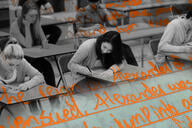You have /5 articles left.
Sign up for a free account or log in.
This much is undisputed: One evening three years ago, a then-professor at the University of Iowa's College of Law tampered with anonymous student evaluations that rate teaching effectiveness. Kenneth Kress admits to replacing three unfavorable student-completed questionnaires with his own versions and altering two others to improve his rating.
It's universally acknowledged that Kress has a mental illness. He is bipolar. He is also a renowned mental health law expert who taught a mental health seminar at Iowa. The question in this unusual case is whether -- as Kress and his lawyer contend -- the former professor was so impaired at the time of the infraction that he can't be held accountable for his actions.
The Grievance Commission of the Iowa Supreme Court, which investigates alleged unethical conduct by lawyers, is recommending that Kress lose his legal license for a year for failing to follow an Iowa code on professional responsibility. The case is on appeal to the Supreme Court of Iowa.
"I'm disappointed with the commission's finding but am optimistic that the Supreme Court will take a different view of Professor Kress's illness and the effect it had on him," said Leon Spies, the lawyer representing Kress.
Kress had been a professor at Iowa from 1989 until last year, when he resigned in what the commission describes as a "confidential settlement with the university." An Iowa spokesman said the university regards this as a personal matter and has no comment. David J. Grace, who is representing the Iowa Supreme Court Attorney Disciplinary Board, which prosecutes claims before the commission, declined to comment on the case.
In a November 2006 hearing, the commission heard that Kress had broken university policy by reviewing evaluations from 10 students before final grades were submitted and comments by the students had been reviewed by the dean. In addition to replacing the three evaluations, Kress changed portions of two other forms from "average" to "outstanding" ratings.
The effect was a raise in the composite score on teaching effectiveness from 2.86 to 4.86 on a scale of 5. Eric Andersen, associate dean at the law school, told the commission that above a 4.5 is considered "very, very good, we don't have many people that get those scores," and that below a 3 is "cause for concern."
Linda McGuire, associate dean for student affairs at the law school, testified that two students whose evaluations were altered said they were "really upset about it." One student in the class told the commission that the professor told students to take the evaluations "more seriously than we had taken other evaluations because he felt like, in so many words, his job was on the line and the faculty was trying to oust him from his position."
According to commission testimony, Kress told students that colleagues were intimidated by him because of his intellect. He told the law school dean that he had been "ill treated" because he had not been awarded an academic chair, a position that often means increased pay. He also testified that students didn't appreciate his teaching.
When administrators told Kress that he was under investigation for tampering with the questionnaires, he first attempted to deflect blame to an assistant and then said "it was possible that he had done something" or that someone else had keys to his office. At the time, he didn't admit or deny changing the evaluations. After retaining a lawyer, Kress's defense became his mental state.
"He was candid with the law school community regarding his bipolar disorder" and was "not ashamed" of his disability, according to the commission.
At the time of the incident, Kress's psychiatrist said his patient was taking mood stabilizers and stimulants, and that he registered an "extraordinarily high" blood sugar level that could impair his thinking and exacerbate his bipolar disorder. As a result, the psychiatrist diagnosed Kress with "delirium" and testified that on the night in question, he likely "did not know the difference between right and wrong."
But a Stanford University medical expert testified that delusion or mental illness was not "attributable in substantial part" to Kress's actions, but that it could have played a contributing role.
Kress told his doctor that he didn't recall changing the evaluations -- though the commission notes that he didn't seek the help of his treating psychiatrist until after he was confronted of the allegations against him. The commission says mental illness is not a sufficient defense in cases of disciplinary complaints.




